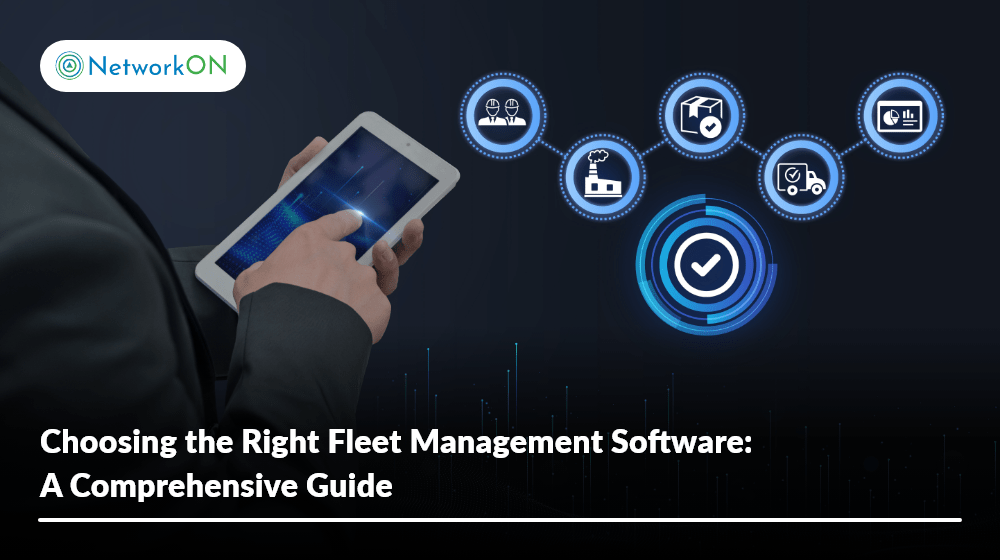Table of Contents
In today’s fast-paced business world, managing a fleet of vehicles efficiently is crucial for any company that relies on transportation to deliver goods or services. Whether you run a small delivery service, a large logistics company, or any business that involves a fleet of vehicles, the importance of fleet management cannot be overstated.
To ensure smooth operations, reduce costs, and improve safety, selecting the right fleet management software is a crucial decision that can make or break your business. In this comprehensive guide, we’ll delve into the intricacies of fleet management software, exploring what it is, its benefits, who should use it, and how to choose the perfect software solution for your specific needs.
What is Fleet Management Software?
Fleet management software is a powerful tool designed to streamline and optimize the management of a fleet of vehicles. It encompasses many functions, including GPS tracking, vehicle maintenance scheduling, driver performance monitoring, fuel management, and more. The software acts as a central hub, providing real-time insights into your fleet’s operations allowing you to make data-driven decisions to enhance efficiency and reduce operational costs.
Benefits of Using Fleet Management Software
Investing in the right fleet management software offers a plethora of advantages for businesses of all sizes:
Improved Efficiency
Fleet management software empowers you to monitor and manage your vehicles in real time, helping you make quick decisions that significantly improve your fleet’s efficiency. It enables you to optimize routes, reduce idle time, and ensure timely deliveries.
Cost Savings
Reducing operational costs is a top priority for any business. Fleet management software helps cut costs by minimizing fuel consumption, decreasing maintenance expenses through regular preventive maintenance, and reducing overtime hours through better scheduling.
Enhanced Safety
Safety is paramount in fleet management. With this software, you can monitor driver behavior, track vehicle speed, and receive instant alerts in case of accidents or unauthorized vehicle use, ensuring the safety of your drivers and assets.
Asset Protection
The software helps you safeguard your valuable assets by providing real-time tracking. In the event of theft, you can locate and recover your vehicles swiftly.
Compliance Management
Fleet management software aids in compliance with industry regulations and standards. It helps track and record important data, ensuring your business stays on the right side of the law.
Who Should Use Fleet Management Software?
Fleet management software is not limited to any particular industry. It caters to a wide array of businesses, including but not limited to:
- Logistics Companies: Streamline deliveries and monitor driver performance.
- Construction Companies: Track equipment and vehicles to ensure they are on job sites when needed.
- Delivery Services: Optimize routes and ensure timely deliveries.
- Public Transportation: Keep track of buses and trains for accurate scheduling.
- Emergency Services: Monitor emergency vehicles for rapid response.
In essence, if your operations involve vehicles, fleet management software can be a game-changer.
How to Choose the Right Fleet Management Software for Your Business
Selecting the perfect fleet management software requires careful consideration. Here are the key steps to make an informed choice:
Considerations for Different Business Sizes
- Small Businesses: For small businesses, cost-effectiveness and ease of use are crucial. Look for software with essential features like GPS tracking, maintenance scheduling, and basic reporting.
- Medium-Sized Businesses: Medium-sized businesses should aim for scalability and versatility. The software should accommodate growth and offer advanced features, such as driver behavior monitoring and fuel management.
- Large Enterprises: Large enterprises require robust solutions that offer comprehensive data analytics, integration options, and multi-fleet management capabilities. Scalability and customization are paramount.
Factors to Consider when Choosing Fleet Management Software
When selecting fleet management software, it’s essential to define the specific features your business needs. These features may include:
- Real-time Tracking: Monitoring your fleet’s location and status in real-time is crucial for effective fleet management. It allows you to respond quickly to changing conditions and optimize routes for on-time deliveries.
- Reporting: Comprehensive reporting tools enable you to analyze data and make informed decisions. Look for software that offers customizable reports to meet your unique business requirements.
- Maintenance Scheduling: Effective maintenance is essential for keeping your fleet in optimal condition. Software that includes maintenance scheduling can help you track and plan routine service, reducing downtime and prolonging vehicle lifespan.
- Integration Options: Consider software that can seamlessly integrate with other systems you use, such as accounting software for financial data or inventory management systems for efficient stock management. Integration streamlines data flow and reduces manual data entry.
Ease of Use
User-friendly software can significantly impact the effectiveness of your fleet management. When your team finds the software intuitive and easy to navigate, they can quickly adapt, reducing the learning curve and ensuring a seamless transition. This leads to more efficient operations and faster ROI.
Scalability
Your business is likely to grow over time, and your fleet management software should be able to keep up. Opt for software that is scalable, meaning it can accommodate your growing fleet and evolving needs without the need for a complete overhaul. Scalability ensures that your investment remains valuable in the long term.
Integration
Fleet management doesn’t exist in isolation. Your software should be able to integrate with other essential systems your business relies on, such as accounting software for financial data or inventory management systems for efficient stock control. Integration streamlines data flow, reduces manual data entry, and enables a more cohesive business operation.
Cost
Cost considerations are crucial when selecting fleet management software. It’s essential to evaluate both the upfront costs and ongoing subscription fees. Ensure that the software you choose aligns with your budget and offers a return on investment by enhancing efficiency, reducing operational costs, and improving safety.
Customer Support
Reliable customer support is vital when using fleet management software. In the event of issues or the need for assistance, having a responsive and knowledgeable support team can be a game-changer. Ensure the software provider offers dependable customer support to keep your fleet operations running smoothly.
Reviews and Recommendations
It’s a prudent step to research and read reviews from businesses in your industry that have successfully implemented fleet management software. Real-world experiences and recommendations from peers can provide valuable insights into the performance, features, and reliability of different software solutions.
Trial Period
Opt for software that offers a trial period. A trial period allows you to test the compatibility of the software with your specific operations. It’s an excellent way to assess whether the software aligns with your needs and is user-friendly before committing to a long-term contract.
Types of Fleet Management Software
There are various types of fleet management software to choose from, each catering to different business needs:
- On-Premises: On-premises fleet management software is installed and managed on your company’s servers. This option offers complete control and security over your data. It’s a viable choice if your business has strict data privacy and security requirements. However, it may require a higher initial investment in hardware and IT infrastructure.
- Cloud-Based: Cloud-based fleet management software is hosted in the cloud, offering accessibility from anywhere with an internet connection. This option is known for its flexibility and scalability. It often includes automatic updates and reduces the burden on your IT department. Cloud-based solutions are suitable for businesses looking for convenience and the ability to access data remotely.
- Integrated Solutions: Integrated fleet management software goes beyond managing just your fleet. It combines fleet management with other business functions, such as inventory management, accounting, and customer relationship management (CRM). This software enhances overall efficiency by streamlining data exchange between various departments, resulting in a more cohesive and productive operation.
How to Implement Fleet Management Software
Once you’ve chosen the right software for your business, it’s time for implementation. Here’s a brief overview of the process:
- Set Clear Objectives: Define your goals and what you aim to achieve with the software.
- Train Your Team: Ensure your employees are well-trained in using the software effectively.
- Data Migration: Transfer your existing data into the new system.
- Testing: Conduct thorough testing to iron out any issues before full implementation.
- Gradual Rollout: Introduce the software in phases to minimize disruptions.
- Continuous Monitoring: Regularly review the software’s performance and make necessary adjustments.
Conclusion
Choosing the right fleet management software is a pivotal decision for any business with a fleet of vehicles. It can improve efficiency, cost savings, safety, and asset protection.
By considering your business’s specific needs and carefully evaluating your options, you can make an informed choice that will drive your business forward. Invest the time and resources necessary to select the ideal fleet management software, and you’ll reap the rewards in the long run.Streamline the logistics arm of your business with NetworkON today. Email us at info@networkon.io or visit our website for more information.





0 Conversations